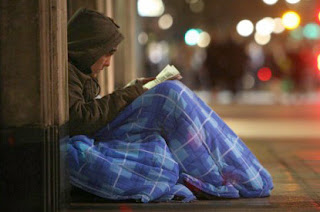Cross-posted from James Bloodworth at Obliged to Offend

Centrepoint, a charity set up to help young homeless people, undoubtedly does good work. By providing temporary accommodation and food to those who sleep rough, the charity gives a lifeline that might otherwise be unavailable to Britain’s many rough sleepers.
Understanding exactly how many people sleep rough in Britain is notoriously difficult, since most homeless people fall outside any formal record-keeping system. However, in 2007-08 teams from CHAIN, London’s most comprehensive database on rough sleeping, counted 3,017 different individuals sleeping rough on the streets of London alone, giving some idea of the scale of the problem.
None of this is helped by complex benefit rules, which mean that a person can be in temporary accommodation and entitled under law to permanent housing from the state, whilst someone on the street sleeping rough is not entitled to housing under the same rules.
Centrepoint’s latest initiative is a so-called ‘Sleep Out’, whereby volunteers are asked to sleep rough on the evening of November 7 in order to raise money and get a feel for what it’s like, as Centrepoint puts it, to ‘sleep on boxes on a hard, cold floor among the bright lights of the city.’
It might seem extraordinarily harsh to criticise such an initiative. Centrepoint are a charity, after all, and the £250,000 they are hoping to raise through sponsorship during Sleep Out is undoubtedly vital to maintaining the many important services they provide to young homeless people.
A closer look at the event, however, left me feeling uneasy. I put this down at first to my own charity induced cynicism – ingrained by the legions of perky people with clipboards jumping in my path every time I leave the house – but a closer inspection of Centrepoint’s website did little to allay my concerns.
Naively perhaps, I assumed Sleep Out would be about developing an understanding of the realities of rough sleeping. There would, after all, be a certain logic to that – by sleeping rough yourself you would invariably put yourself in the shoes of other, less fortunate people, thereby gaining an insight into how they feel on a day to day basis. In other words, you would learn empathy.
With this in mind I did not expect to stumble across the following sentence in the promotional material:
‘Sleep Out is not just about sleeping. There will be plenty of entertainment in the evening, and even a bedtime story from Christopher Biggins!’
Now I’ve nothing against bedtime stories with Christopher Biggins, nor am I a believer in a strictly dour, Victorian form of altruism. There is nothing inherently wrong with being cheerful; and while wackiness can be incredibly annoying, I can see its purpose when it comes to hectoring otherwise busy individuals into giving money.
Were it only the above sentence I would probably let it slide, but further browsing of Centrepoint’s website led to the picture I had in my mind of a solidarity exercise being replaced by a sense that the whole thing was little more than a gimmick – and a fairly offensive gimmick at that.
I found the following in the FAQ section:
‘You will be sleeping in a secure area and we will have security guards to protect you and your belongings.’
‘There will be a canopy overhead, so you will be protected from the elements too.’
‘Refreshments [will be] provided throughout the night.’
‘Goody bags for all participants.’
‘A best fundraiser prize for the person or team who raise the most.’
‘Breakfast served from 6am.’
Now I don’t know about you, but that sounds almost like an improvement on the sleeping arrangements of many working class people, let alone rough sleepers. Presumably the security guards who watch over Sleep Out’s participants are also under strict orders not to allow genuine rough sleepers into the encampment, despite the fact they could probably do with the free refreshments and hot breakfasts on offer.
You might wonder if any of this matters if the end result is a lot of money being raised for a good cause. Yet being homeless is not something that can be sanitised, and reducing it to an outdoor jolly where people huddle together and laugh at Christopher Biggins with tea and breakfast on demand – while actual rough sleepers gawk through security fences at the people pretending to be them – is in bad taste to say the least.
It would perhaps be nice if, as a bare minimum, we evolved a kind of charitable giving whereby we treated those on the receiving end of our good fortune as actual human beings, rather than locked them out of the process behind security guards and fences.
It would also be nice if we did away with the cynical notion that ‘fun’ is the only way we can get people to give a second thought to those less fortunate than ourselves.